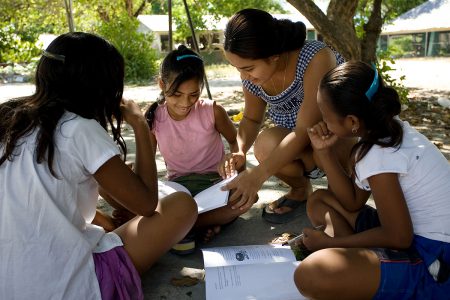“Regard man as a mine rich in gems of inestimable value. Education can, alone, cause it to reveal its treasures, and enable mankind to benefit therefrom.”In recent years, training institutes around the world have been playing an increasingly important part in the training of teachers to conduct classes for the spiritual education of children. The materials being developed for use by the institutes emphasise the acquisition of spiritual qualities—for example, truthfulness, generosity, purity of heart, and kindness, to name a few—which are considered attributes of God that are reflected in the mirror of the human heart. Year after year, the materials build on the understanding of these qualities and add lessons related to the history and the Writings of the Bahá’í Faith. The goal is for the children to reach a stage in which they can understand and act upon the imperative to tend to their own spiritual development and contribute to the well-being of society.— Bahá’u’lláh
 The institutions of the Faith also pay a great deal of attention to the question of raising human resources to conduct children’s classes. In this regard, they dedicate significant resources to bringing into being and maintaining an effective system of coordination for the training of teachers, opening channels for the flow of guidance, educational materials, and learning to and from the grassroots.
The institutions of the Faith also pay a great deal of attention to the question of raising human resources to conduct children’s classes. In this regard, they dedicate significant resources to bringing into being and maintaining an effective system of coordination for the training of teachers, opening channels for the flow of guidance, educational materials, and learning to and from the grassroots.
